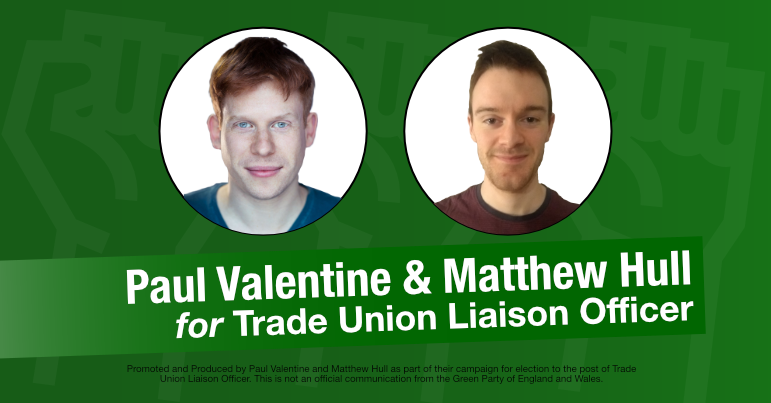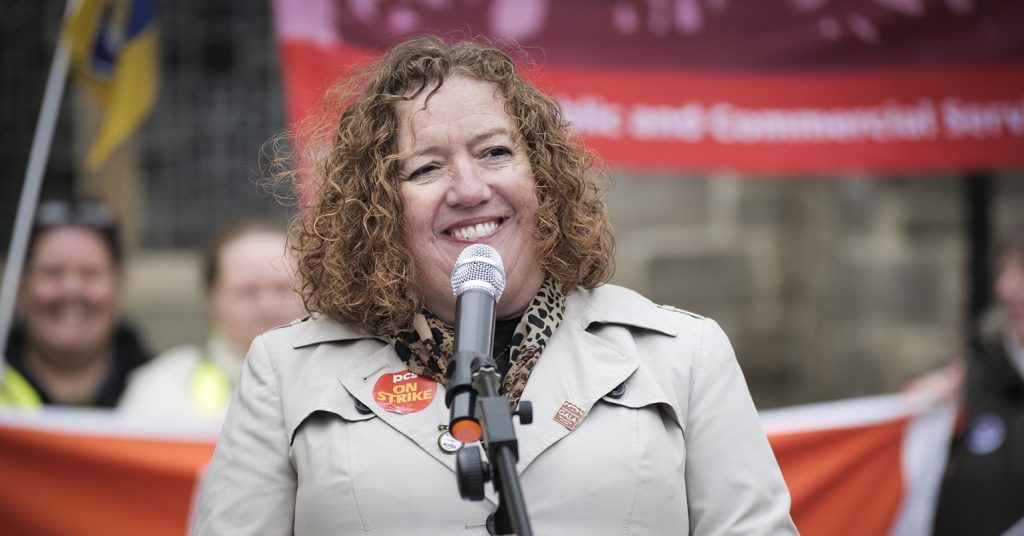Interview with Matthew Hull and Paul Valentine – Trade union liaison officer candidates for GPEx

Throughout August, members of the Green Party for England & Wales will be voting to elect members of the next Green Party Executive (GPEx). This year will see people elected to eleven different roles – including those of leader and deputy leader. There is also a ballot to determine who will be the party’s third member in the House of Lords should the party be asked to put forward another peer.
Matthew Hull and Paul Valentine are standing as a job share for the position of trade union liaison officer. Hull is currently treasurer of the Young Greens, and Valentine is the incumbent trade union liaison officer on GPEx.
The other candidates are Birmingham Green Party activist Kefentse Dennis and former Somerton & Frome general election candidate Theo Simon.
We asked each of the candidates five questions on their background and what they would seek to achieve on GPEx. Here are Matthew Hull and Paul Valentine’s responses.
What do you think are the main challenges currently facing the Green Party, and how would you work to overcome them?
As Matthew has written for Bright Green, the party faces a number of significant political challenges that the new executive must be prepared to grapple with.
In terms of its political positioning and overall strategy, the party is at a crossroads. External political conditions have changed completely – Brexit is now more-or-less a question of ‘how’, not ‘if’; under Keir Starmer the Labour Party is abandoning any pretence of standing for transformative social change. The lodestars around which the party had positioned itself have moved substantially. In this context, we seriously need to build and implement a political strategy that will guide our progress over the next parliament.
For us, this means a strategy that does justice to the party’s radical policies. It should set out what a social and political coalition for transformative change would look like, where our power in society lies, which union and social movement organisations we need to build robust relationships with, and so much more. In short: a picture of what it looks like to be a movement on the cusp of winning this power, and a roadmap to get there.
This picture will naturally be rich and detailed – and we can’t set it all out here and now – but we envision a Green politics with radical democracy, social and environmental justice, and liberation politics at its heart.
Finally, the party’s executive must exemplify the same openness and accountability that we rightly demand of politicians. The party needs dedicated and knowledgeable people to provide sound democratic governance, and we know we have what it takes.
What skills do you bring that would make you an effective member of the executive?
Between us, we will bring a wealth of experience to the executive. As long-term party activists, we have first-hand experience of organising and delivering local campaigns. We know what local parties and regions need in terms of material support, and this will guide our approach to our work on the executive.
Paul has been Trade Union Liaison Officer since 2018 and has been an integral member of the executive. He has built strong relationships with trade unions, and has found new ways to foster cooperation between the party leadership and union campaigners. We can’t wait to build on this by massively ramping up the support offered to local and regional Green Party officers, helping them to work closely with trade union campaigns.
Matthew has a strong background in campaigning and campaigns organisations. He is currently Treasurer of the Young Greens, and helped organise three of their biggest election campaigns to date. He also co-organised their political education and training series this year, which reached hundreds of young activists. These skills and experiences will be vital as we take the Trade Union Liaison position further, offering a series of trainings and support sessions to help local Greens build strong relationships with union branches and trades councils.
Paul’s experience on GPEx and Matthew’s experience working for a campaigning organisation make us well-equipped to play a key role in GPEx’s management and oversight duties.
What is your experience in trade union organising and working with trade unions in external organisations?
We are running for Trade Union Liaison because we have a strong background in union organising and campaigns, and with our combined networks and capacity we can make it a real success.
Paul is the branch chair of the PCS union at Southbank Centre in London, and also serves as the Young Members’ Councillor for Equity. Being active in trade unions at all levels gives Paul a perspective on union work that is unrivalled in this race. Through these roles, including his work with TUC Young Workers, Paul has developed knowledge and networks that will allow us both to build strong, organic relationships with trade unionists.
Matthew is workplace rep in Unite the Union’s Community, Youth, and Non-Profit Sector, and has already worked hard to build working relationships with key union campaigners. He has secured support for Young Greens events from Unison and the trade union-backed Campaign Against Climate Change. He has led on union-related Young Greens initiatives, including around the TUC’s #HeartUnions week, and hosted a Young Greens talk with the radical United Voices of the World union.
With our combined energy, creativity, and proven ability to work closely with trade unionists, we’re well placed to turbo-charge the party’s working relationship with unions.
How do you see the relationship between the Green Party and trade unions being strengthened?
We are proud of the party’s pro-union policies, and we want these to be reflected in the way we campaign to transform society. Not only that, but we see a strong trade union movement as fundamental to the task of winning a just transition from fossil capitalism to a sustainable future.
By organising working people at a key site of exploitation – our work – trade unions have enormous potential for winning the hearts and minds of communities across the country. Not only that, unions can also be social movements’ most powerful backers, advancing their interests against elite opposition. We want to look to the best of the trade union movement, past and present, and draw strength and inspiration from it.
We want Green leadership nationally to position itself as the real supporter of militant, rank-and-file trade unionists. There is so much that we can do to raise the profile of union struggles, providing direct support and emphasising that our movement is the preferential option for working people.
But building strong relationships takes time and effort. That is why we have made working directly with local and regional Green Party officers our key priority. Lots of Green councillors and campaigners will already have good working relationships with trades councils and union branches; we want to help these develop further. Other Greens will not have such experience; we want to help them establish these relationships with trade unionists. We will deliver a series of trainings to strengthen the party’s relationship with unions, from the ground up.
What current trade union struggles would you like to see the Green Party acting in solidarity with?
In recent years thousands and thousands of people have taken action in their workplace for the first time. We are inspired by the militancy and dedication of these movements, and we would love to see the Green Party taking action with them.
We have seen working people fighting back against oppressive and unjust forms of work. For example, the last few months has seen an explosion of organising against practices of outsourcing and insecure contracts. It was fantastic to see outsourced staff at St Mary’s hospital in London win their campaign for 1,000 staff to be brought ‘in house’, securing decent pay, pensions, working conditions and much more.
What is particularly exciting about these struggles is that they are making clear links between different forms of oppression and recognising that they need to be fought together. The practice of outsourcing workers to third-party companies is not just anti-worker – it is racist and sexist too.
Take, for example, United Voices of the World’s legal challenge against outsourcing on the grounds that it constitutes racial discrimination. The most vibrant union organisers are focusing on how class, race, gender, and other hierarchies are bound together in a system that profits from them, and organising working people against all these oppressions. The potential for a genuine synthesis of trade union and social movement struggles is exhilarating, and we believe that the Green Party could and should be a leading voice on this.
As young people who are no strangers to low pay and bad contracts, we have a serious interest in all campaigns led and powered by young people. We are excited by any campaigns with the potential to build union membership and activity among young workers.
Ultimately, as your Trade Union Liaison Officer it will be our task to bring people together around their different struggles against a common enemy. We cannot wait to get started.
This interview is part of a series with each of the candidates in this year’s GPEx elections. You can find Bright Green’s full coverage of the elections here.
PS. We hope you enjoyed this article. Bright Green has got big plans for the future to publish many more articles like this. You can help make that happen. Please donate to Bright Green now.




Leave a Reply